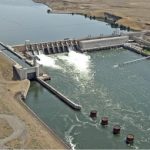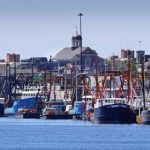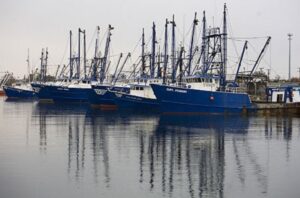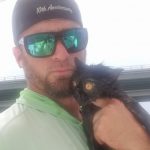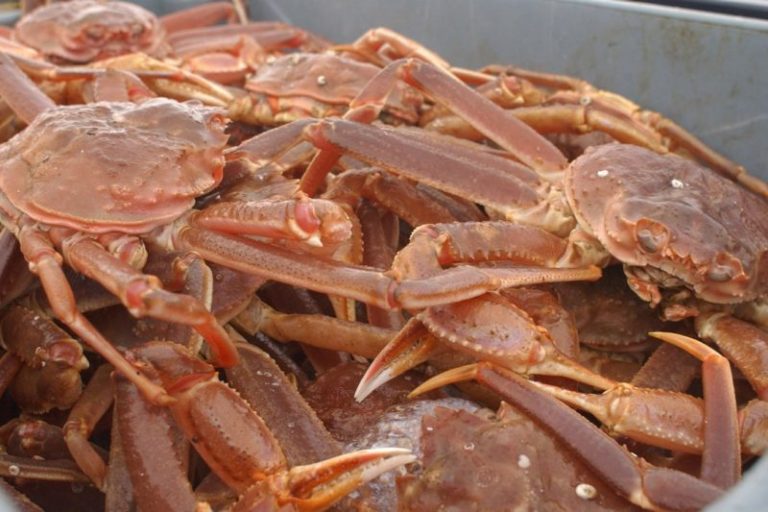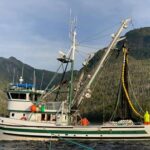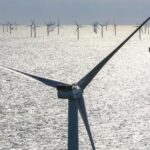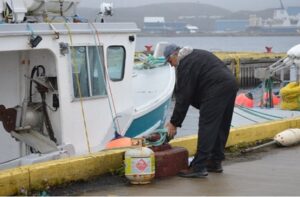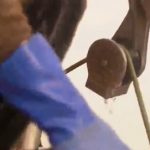Daily Archives: February 25, 2016
Great Lakes Fisheries Heritage Trail: Katherine V a lone survivor and fishing legend
 A Great Lakes gill net fish tug, the Katherine V was built in 1928 on the shores of northern Lake Huron in Rogers City by Native American builder Henry Vincent, and was fished by the Vogelheim family, who owned and operated the Katherine V from her launch until retirement in 1970. At 57 feet in length, entirely enclosed, and powered by a Kahlenberg 3-cylinder engine the tug is an example of late 19th and early 20th century Great Lakes commercial fishing vessels. Constructed of white oak, northern white cedar and cypress, the boat was eventually sheathed in steel and aluminum early in its fishing career to aide in fishing through the winter. Read the rest here 19:27
A Great Lakes gill net fish tug, the Katherine V was built in 1928 on the shores of northern Lake Huron in Rogers City by Native American builder Henry Vincent, and was fished by the Vogelheim family, who owned and operated the Katherine V from her launch until retirement in 1970. At 57 feet in length, entirely enclosed, and powered by a Kahlenberg 3-cylinder engine the tug is an example of late 19th and early 20th century Great Lakes commercial fishing vessels. Constructed of white oak, northern white cedar and cypress, the boat was eventually sheathed in steel and aluminum early in its fishing career to aide in fishing through the winter. Read the rest here 19:27
Herring fishery’s strength is in the sum of its parts, study finds
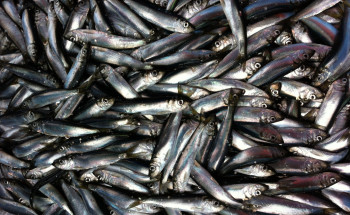 A wise investor plays the financial market by maintaining a variety of stocks. In the long run, the whole portfolio will be more stable because of the diversity of the investments it contains. It’s this mindset that resource managers should adopt when considering Pacific herring, one of the most ecologically significant fish in Puget Sound and along the entire West Coast, argue the authors of a paper appearing in the January 2016 print edition of the journal Oecologia. Just like a financial portfolio contains shares from different companies, the diverse subpopulations of herring from different bays and beaches around Puget Sound collectively keep the total population more stable, the study’s authors found. Read the article here 18:17
A wise investor plays the financial market by maintaining a variety of stocks. In the long run, the whole portfolio will be more stable because of the diversity of the investments it contains. It’s this mindset that resource managers should adopt when considering Pacific herring, one of the most ecologically significant fish in Puget Sound and along the entire West Coast, argue the authors of a paper appearing in the January 2016 print edition of the journal Oecologia. Just like a financial portfolio contains shares from different companies, the diverse subpopulations of herring from different bays and beaches around Puget Sound collectively keep the total population more stable, the study’s authors found. Read the article here 18:17
Large vessel owners accuse FFAW of ‘double standard’ – Fishing industry divided on how to handle northern shrimp
 A union call to shut down the lucrative shrimp fishery off the northeast coast of Newfoundland and the south coast of Labrador because of declining stocks has other players saying that goes too far. It’s a politically charged debate, with roots in the battle between huge factory freezer trawlers and smaller inshore vessels, about who will get a share of the dwindling resource. “I’m nervous,” Twillingate harvester Brad Watkins told the Central Morning Show Thursday, saying a shutdown could drive brokers and buyers to other parts of the world. “That’s a very scary thing to be thinking about. I think they are jumping too fast here,” said Watkins. Read the rest here 16:02
A union call to shut down the lucrative shrimp fishery off the northeast coast of Newfoundland and the south coast of Labrador because of declining stocks has other players saying that goes too far. It’s a politically charged debate, with roots in the battle between huge factory freezer trawlers and smaller inshore vessels, about who will get a share of the dwindling resource. “I’m nervous,” Twillingate harvester Brad Watkins told the Central Morning Show Thursday, saying a shutdown could drive brokers and buyers to other parts of the world. “That’s a very scary thing to be thinking about. I think they are jumping too fast here,” said Watkins. Read the rest here 16:02
Fish found in Washington’s Puget Sound are tripping on cocaine, Prozac, Advil, Benadryl, and Lipitor.
 Unfortunately, there is no aquatic drug dealer responsible for it. Instead, the intoxication is the result of tainted discharge water. Pharmaceutical pollution could be to blame for the many drugs showing up in the tissues of juvenile Chinook salmon. Estuary waters near the sewage treatment plants were found to contain a cocktail of up to 81 different drugs, according to a new study out of the National Oceanie and Atmospheric Administration (NOAA). There are several plausible theories about the Puget Sound’s high concentration of . Jim Meador, an environmental toxicologist at the NOAA’s Northwest Fisheries Science Center in Seattle, published a study that offered two options. Read the rest here 14:03
Unfortunately, there is no aquatic drug dealer responsible for it. Instead, the intoxication is the result of tainted discharge water. Pharmaceutical pollution could be to blame for the many drugs showing up in the tissues of juvenile Chinook salmon. Estuary waters near the sewage treatment plants were found to contain a cocktail of up to 81 different drugs, according to a new study out of the National Oceanie and Atmospheric Administration (NOAA). There are several plausible theories about the Puget Sound’s high concentration of . Jim Meador, an environmental toxicologist at the NOAA’s Northwest Fisheries Science Center in Seattle, published a study that offered two options. Read the rest here 14:03FFAW-Unifor NEWS RELEASE: Thousands of Jobs at Risk in Northern Shrimp Fishery
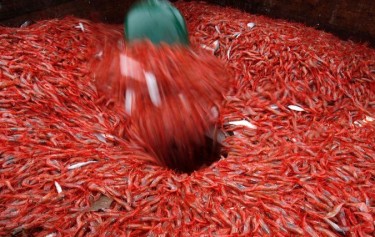 Thursday, February 25, 2016 St. John’s – Thousands of harvesting and processing jobs in rural Newfoundland and Labrador may be lost if the current fisheries management policies for northern shrimp are maintained. The Fish Food and Allied Workers Union (FFAW-Unifor) is providing further details on the impact of sharp declines in the northern shrimp stock as outlined in Fisheries and Oceans Canada’s (DFO) stock status report. “The implications of the stock status report, if they are confirmed, will be challenging if DFO’s quota allocation policies do not change,” said Keith Sullivan, President of the FFAW. Read the press release here 11:56
Thursday, February 25, 2016 St. John’s – Thousands of harvesting and processing jobs in rural Newfoundland and Labrador may be lost if the current fisheries management policies for northern shrimp are maintained. The Fish Food and Allied Workers Union (FFAW-Unifor) is providing further details on the impact of sharp declines in the northern shrimp stock as outlined in Fisheries and Oceans Canada’s (DFO) stock status report. “The implications of the stock status report, if they are confirmed, will be challenging if DFO’s quota allocation policies do not change,” said Keith Sullivan, President of the FFAW. Read the press release here 11:56
Labrador crew maintain their smiles despite heavily damaged Arctic vessel
 The crew of a fishing vessel that ran into trouble in the Davis Strait is being praised for its quick thinking. “There was a few tense moments definitely on the ship,” said Maj. Rhonda Stephens of the Joint Rescue Coordination Centre in Halifax. The F/V Saputi was fishing for turbot Sunday night when it ran into a piece of ice and began taking on water. Some of the 30 crew members are from Labrador. A Danish Coast Guard ship was able to reach the Saputi and the crew are now safe in Nuuk, Greenland. Photo’s, read the article here 09:40
The crew of a fishing vessel that ran into trouble in the Davis Strait is being praised for its quick thinking. “There was a few tense moments definitely on the ship,” said Maj. Rhonda Stephens of the Joint Rescue Coordination Centre in Halifax. The F/V Saputi was fishing for turbot Sunday night when it ran into a piece of ice and began taking on water. Some of the 30 crew members are from Labrador. A Danish Coast Guard ship was able to reach the Saputi and the crew are now safe in Nuuk, Greenland. Photo’s, read the article here 09:40
Fisherman blames factory freezer trawlers for shrimp decline
 Roland Genge, a fishing boat captain and the deputy mayor of the town of Anchor Point on the Northern Peninsula, has been predicting a change for years, and believes someone should have known there would be damaging effects of trawlers on the inshore fishery. “I’ve been writing (about this) since 2008,” the 38-year veteran shrimp fisherman explained. “I told (the government) where it was going to be to today. “It’s devastating to our area. You’re going to kill all the communities with this.” Predictions of the state of the shrimp fishery were made public earlier this week when the Fish, Food and Allied Workers (FFAW) in a press release (here) The union has been told the shrimp biomass is down about 40 per cent. Read the rest here 08:52
Roland Genge, a fishing boat captain and the deputy mayor of the town of Anchor Point on the Northern Peninsula, has been predicting a change for years, and believes someone should have known there would be damaging effects of trawlers on the inshore fishery. “I’ve been writing (about this) since 2008,” the 38-year veteran shrimp fisherman explained. “I told (the government) where it was going to be to today. “It’s devastating to our area. You’re going to kill all the communities with this.” Predictions of the state of the shrimp fishery were made public earlier this week when the Fish, Food and Allied Workers (FFAW) in a press release (here) The union has been told the shrimp biomass is down about 40 per cent. Read the rest here 08:52
Breaking News: Fishing boat crew rescued after boat runs aground off Rockaway Beach
 All seven crew members have been rescued from a fishing boat that ran aground off Rockaway Beach in Queens Thursday morning. They were taken off the boat using a basket from a Coast Guard helicopter above. They are uninjured and being treated near the scene. Around 2 a.m., a Coast Guard command center on Long Island received a distress call from the 76-foot scallop fishing vessel Carolina Queen III. It was taking on water with seven crewmembers aboard. It had run aground just off Rockaway Beach and Beach 59th Street, near the East Rockaway Inlet. Watch the video, read the rest here 08:24
All seven crew members have been rescued from a fishing boat that ran aground off Rockaway Beach in Queens Thursday morning. They were taken off the boat using a basket from a Coast Guard helicopter above. They are uninjured and being treated near the scene. Around 2 a.m., a Coast Guard command center on Long Island received a distress call from the 76-foot scallop fishing vessel Carolina Queen III. It was taking on water with seven crewmembers aboard. It had run aground just off Rockaway Beach and Beach 59th Street, near the East Rockaway Inlet. Watch the video, read the rest here 08:24
NOAA At-sea monitoring suspended (for now) – To start again March 1, when boats must pay costs
 NOAA Fisheries exhausted its budgeted money for at-sea monitoring of Northeast fishing sector groundfish boats on Feb. 16 and has suspended all required monitoring until the fishing industry assumes monitoring costs on March 1. The details of the suspension, which has not been publicly announced by NOAA, were contained in a Feb. 19 declaration filed by NOAA Regional Administrator John K. Bullard in the federal lawsuit New Hampshire fisherman David Goethel of Hampton filed against the National Oceanic and Atmospheric Administration, the Department of Commerce and officials within those federal agencies. “On or about Feb. 16, the (Northeast Fisheries) Science Center became aware for the first time that recent updates did not include information for all completed trips … and that committed government funds to pay for ASMs had been exhausted,” Bullard wrote in his declaration. Read the rest here 08:06
NOAA Fisheries exhausted its budgeted money for at-sea monitoring of Northeast fishing sector groundfish boats on Feb. 16 and has suspended all required monitoring until the fishing industry assumes monitoring costs on March 1. The details of the suspension, which has not been publicly announced by NOAA, were contained in a Feb. 19 declaration filed by NOAA Regional Administrator John K. Bullard in the federal lawsuit New Hampshire fisherman David Goethel of Hampton filed against the National Oceanic and Atmospheric Administration, the Department of Commerce and officials within those federal agencies. “On or about Feb. 16, the (Northeast Fisheries) Science Center became aware for the first time that recent updates did not include information for all completed trips … and that committed government funds to pay for ASMs had been exhausted,” Bullard wrote in his declaration. Read the rest here 08:06

































